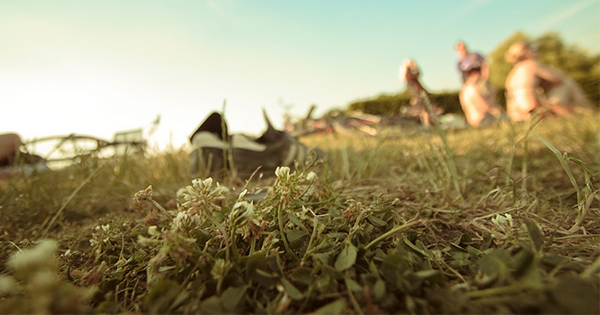
Among the greatest of summer pleasures, along with hosing down the dog and gaping at mating dragonflies and exulting and capering with a small child when he hauls in a fish smaller than his hand, is being sans shoes for a week—bootless, sandal-free, shy of moccasin, unshod, pedestrianude, able to see the wriggle of toe, the hard of heel, the amazing architecture of that which is almost always, except for bed and shower, hidden and armored, grimly socked and girded against the stings and cobbles, the pebbles and pricks, the thorny things of the world. But not for that week in summer, at the beach, at the lake, in the mountain meadow.
So many millions of beings on this rocky starship go shoeless not by choice but by necessity, having neither shoes nor scrip to buy them; and another good thing that happens when you are shoeless in summer is that perhaps you think about this for once, and feel a quiet empathy that what is pleasure to you is quotidian and unpleasant for them; and perhaps empathy, rather than its colder cousin sympathy, leads toward conversation and action. Was it, for example, a broken pair of eyeglasses that led one and then a dozen and then thousands of men and women and children around the world to collect old eyeglasses and spectacles for those who need them but do not have a penny to buy them? Does a long thirst lead to organizing water brigades to people in the driest climes, shivering that led to coat drives, piercing hunger that led to food banks?
A day without shoes—on the beach, at the lake, in a mountain meadow—is a delight, a reprieve for your poor paired pins, which do so much carrying and carting, and rarely get to gambol and be naked; but a week without shoes, that is one way to spell a true and genuine vacation. To arise and pad and shuffle, without the slightest concern for sock and shoe; to breakfast barefoot, and watch pelicans and seals and eagles and warblers barefoot, and barefoot sip a beer, late in the afternoon, ankle-deep in the receding surf; to eat dinner by candlelight wearing not a hint of polite and professional footwear, to barefoot pad out to the deck to hope for shooting stars, to wander around barefoot making sure the kids are in bed, wary only of loose toys underfoot—this is luxurious, lazy, lovely, and a crucial thread of summer’s fabric, it seems to me. We so often sing the major chords of summer’s song—light and heat, ale and ice cream, out of office and away from mail, wiffleball and volleyball, camps and cabins—but occasionally we should hum the smaller tunes, the ones that compose a deep layer of whatever it is each of us believes summer to be at its best. The faraway jangle of the ice-cream truck; the choir of crickets at night; the dark amused gleam of sunglasses; the alluring grinning scent of suntan lotion; the sleepy drone of baseball on the radio; the grumble and rumble of surf, and its infinitesimal key changes as the tide waxes and wanes; the sight of a small plane towing a banner over the beach; and, for me at least, the visceral mammalian pleasure of barefooting. It was how we all once were, and are hardly ever now; and along with the sheer animal pleasure of skin against air is perhaps at least a hint of the body as it anciently was, at least in summer, delightfully open to the elements, before the earth spun away yet again from its salvific star, and once again we donned skins and furs against the bitter winter, the encroaching dark.

